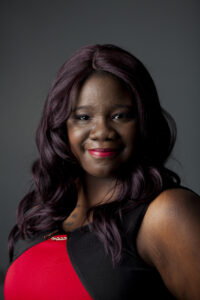
Photo submitted by Kaviena Spencer
Growing up, my parents had a rule, I wasn’t allowed to wear color nail polish. During that time, I just thought my parents were being strict. How could something that all my friends were doing could be so bad?
When I asked parents about it, they said one thing “it was too grown.”
Back then I had no idea what that meant, I just thought it was my parents’ way of preventing me from having fun. But now that I am older, I realize that so many other black girls were treated the same way.
Nearly every black woman has a story of being sexualized when they were a child. We have been told we were “fast” because of the clothes we wore or how we would style our hair.
If you go on any social media platform, there’s often a person posting a picture of a little black girl wearing a cute outfit or has colored hair with a caption that says, “do ya’ll think this is too grown or is it just me?”
How can a photo of a little girl with purple braids be considered too grown?
Now I’m not saying that my parents sexualized me but their reasoning for preventing me to take part in something as harmless as a pink nail polish comes from a history of hypersexualizing black girls.
You can trace the history of the hypersexualization of black girls back to slavery. During slave times, black girls were forced to cook and clean and pleasure their masters.
Also during slavery, black people were seen as objects, something for their masters to own and use. Most black girls were chosen or bought because of the shape of their bodies.
You can also trace this back to the caricature of Jezebel. It perpetuates the idea that black girls are born knowing what sex is, that we become sexually active at a young age and that we have a hard time turning down sex.
These ideas lead to black girls becoming more victims and less believed when it comes to sexual assault and rape.
According to the U.S. DOJ Bureau of Justice Statistics, African American girls and women 12 years old and older experienced higher rates of rape and sexual assault than White, Asian, and Latina girls and women from 2005-2010.
When the docu-series “Surviving R. Kelly” premiered on Lifetime, a lot of older black women rushed to social media to demonize his victims. They pointed out the clothes they wore and their attitude. They did everything they could to place the blame on a 14-year-old for being sexually assaulted.
We can put the blame of hypersexualization not only on our elders but also on our school systems. When I was in high school, girls were not allowed to wear shorts that came too far above our knees but there was a silent loophole. Most of the time if you were white you could wear the shorts because you had no curves but as soon as a black girl was wearing shorts that didn’t come past her fingertips, it was off to the principal office with her.
In the study, Listen to Black Woman and Girls, a woman describes her experience of being sexualized by her school’s nurse.
“In … sixth grade, … the school nurse, like, ask[ed] my aunt if I was sexually active …. And I was, like, at the time, like, what? Like, what? Nobody has sex. Like, I didn’t know anyone that had sex. And it was so crazy to me. And then just thinking, like, she would never think to ask my [white] friend that.”
The girl was in 6th grade meaning she had to be 11 or 12 years old. What 12-year-old knows about sex? Another woman described that her teacher assumed that she wanted all the boy’s attention because of the simple fact that she was wearing shorts.
In a report from Georgetown University law school’s Center on Poverty and Inequality, it was found that little black girls, particularly those ages 5 to 14, are seen as more sexually mature & know more about adult topics than white girls in the same peer group.
I have yet to meet a 5-year-old who knows anything about sex, and I doubt I ever will.
Little black girls are not granted the luxury of being just that. Little. Black. Girls. In this decade, it’s time we change that. Black girls should be granted the same benefit of the doubt as non-black girls.
Black girls should not have to worry about the clothes they wear because they fear it will invite unwanted attention. Black girls deserve our protection and it’s time we give it to them.